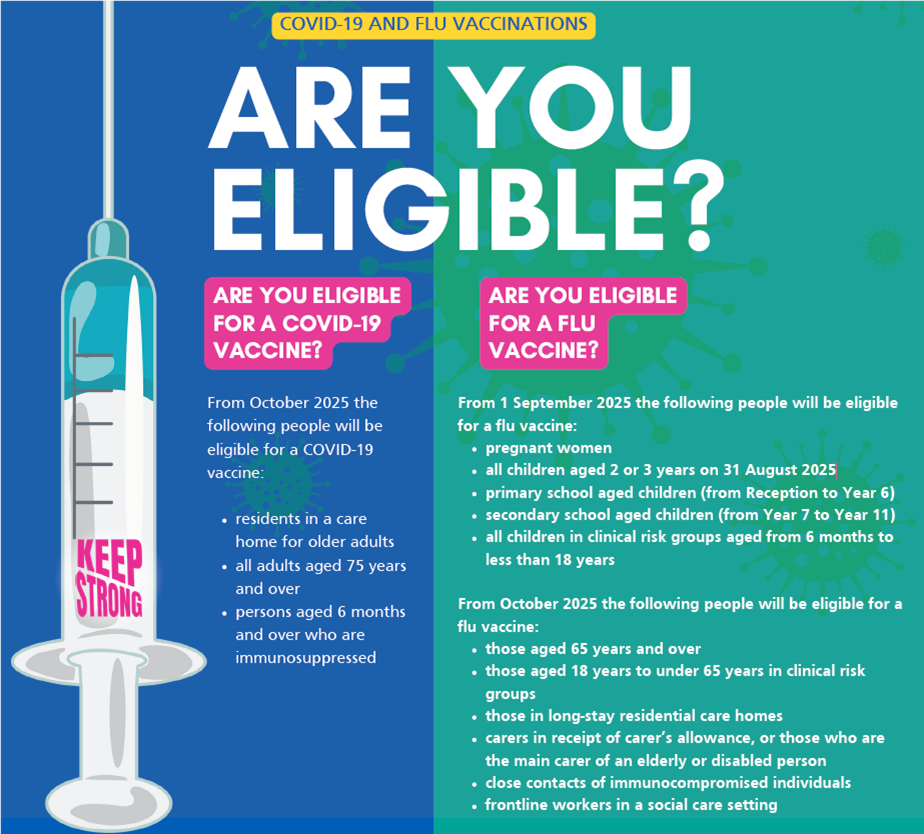Vaccine Booking Now Open
We are now taking bookings for eligible patients.
If you have received a self-booking link, please use it to book onto one of the available dates.
If you do not wish to have your vaccine, kindly let us know.
For 2025, there has been a significant change to eligibility criteria for the Covid vaccine. Building on advice from the Joint Committee on Vaccination and Immunisation (JCVI), eligibility has been narrowed significantly compared to previous years – targeting those at highest risk of severe illness.
The below table explains the eligibility changes in more detail. The 2024 criteria, in red, no longer applies.
|
Group |
Autumn 2024 Criteria |
Autumn 2025 Criteria |
|
Eligible Age |
Adults 65 years and over |
Adults 75 years and over |
|
Medical Criteria for Patients under the Eligible Age |
– Residents in older adult care homes |
– Residents in older adult care homes
|
We understand that these changes may be disappointing for some of our patients. However, Tunstall Primary Care must follow the national criteria set by the JCVI and the NHS. Unfortunately, this means we are not able to vaccinate patients who are not eligible under the new rules.
For more information on the new criteria, please go to https://www.nhs.uk/vaccinations/covid-19-vaccine/
Protect Yourself Against RSV This Winter
Respiratory Syncytial Virus (RSV) can cause serious illness, particularly in older adults and those with underlying health conditions.
We are now offering RSV vaccinations for eligible patients.
If you have received a booking link, please use it to schedule your appointment. If you prefer not to have the vaccine, let us know so we can update our records.
Getting vaccinated helps protect you and those around you.
Book your RSV vaccine today and stay protected this season.
Who Can Get the RSV Vaccine?
The RSV vaccine is being offered on the NHS to:
- Pregnant women – from 28 weeks of pregnancy (or as soon as possible after that). Protection passes to your baby before birth.
- Older adults – People turning 75 years old on or after 1 September 2024
- Those aged 75 to 79 years on 31 August 2024 (catch-up group, eligible until their 80th birthday)
- Anyone who turns 80 after 1 September 2024
If you are in one of these groups, you will be invited to book your RSV vaccine.
Not sure if you’re eligible? Please contact the practice and we’ll be happy to advise
Protect Yourself Against Shingles
Shingles can be a painful condition that sometimes leads to long-term complications. The good news is that there is a vaccine available to help protect you.
The Shingles vaccine is now offered on the NHS to eligible patients, including:
- Adults turning 65 years
- Adults aged 70 to 79 years (catch-up programme)
- Adults with a severely weakened immune system (from age 50 years)
If you are eligible, you will be invited to book your vaccine.
Getting vaccinated helps protect you from shingles and its complications.
Contact the practice if you’d like to check your eligibility or book your appointment.


